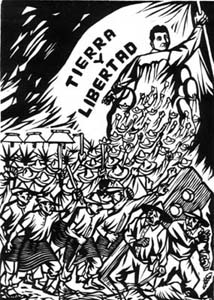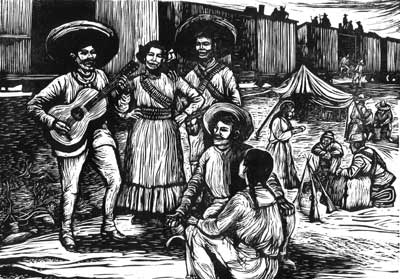|
 exico
files exico
files
|
Is Zapatism a Libertarian Movement?
by Pietro Vermentini
An Italian anarchist living in Chiapas
tries to answer to this question. And he explains why
the answer is yes...
|
 |
As an anarchist living
in Mexico and supporting the Zapatista movement, I am often
asked this question by many comrades from different places.
I therefore wish to use this space to
give an answer, though I am aware that this is simply my personal
view and, as such, it is undoubtedly partial or open to question.
I believe that Zapatism (or rather,
Neo-Zapatism) has attempted, since its arrival on the scene
in 1994, to avoid any labels, underlining only that human beings
have their hearts on the left. They also affirm that the world
they want to build is a multi-coloured world, with enormous
diversity, a world with justice, freedom and democracy for all.
Not wishing to label (or to be labelled),
I believe that it is important to see what the most important
characteristics of this movement are. Analyzing their words
(that is, documents and communiqués), I believe these can be
summarized in the following points:
1 Antimilitarism: an army yes, but
only for self-defence, the end of which is its own extinction.
The EZLN is a poorly equipped army,
which is supported thanks to the logistical collaboration of
the communities. It is not a guerrilla force, but an army, and
by this I wish to emphasize the direct participation of the
communities in the war, which gives the conflict a mass character:
there is participation at various levels in the war effort,
which all have decided upon.
Marcos said during the National Democratic
Convention: Fight. Fight without rest. Fight and defeat the
government. Fight and defeat us. A defeat will never be so sweet
as one that results in the peaceful transition to democracy,
dignity and justice; then, underlining how weapons aspire to
be useless: Military logic is the most antidemocratic and antihuman
logic that exists. In this sense, the EZLN has a suicide wish.......
a wish to disappear as an army.
Command by obeying is not just a phrase,
but a concrete fact, and this seems to be exemplified by the
Consultation that took place in 95, in which the whole population
was given the possibility to decide what the destiny of the
military organization would be.
2 Non-Power: the EZLN radically
changes the logic of the most recent (and current) Latin-American
guerrilla wars: the struggle is not for power, the very meaning
of which is often attacked and derided, but precisely to achieve
justice, freedom and democracy.
Take power? No, something more difficult:
a new world, wrote Marcos in a letter to the writer Gaspar
Morquecho, a month after the beginning of the uprising. This
is evidently one of the most difficult points to understand
for all the movements that, in one way or another, make reference
to Marxism in their conception and so are unable to conceive
a revolution without taking power. On many occasions I have
happened to see the embarrassment of Marxist or Pseudo-Marxist
politicians and intellectuals, who, with their closed minds,
made up of slogans learned by heart, could find no response
to the fact that the Zapatistas can think of a revolutionary
process without taking power. Most of these managed to answer
the question Without
Answering (we already know that politicians the world
over are masters at this). Those who have not learned the modern
art of politics so well reach the point of denying what has
consistently been repeated by the Zapatistas and, with an ironic
smile, mutter but no, they are just saying that for propagandas
sake, youll see later.....
The anarchists alone have always insisted
on this point; indeed, it was precisely on the subject of taking
power through the formation of political parties, to then establish
socialism, that the incurable fracture came about within the
First International between Marxists and anarchists.
If the causes of the evil continue
to exist, even if Native Americans come to power, they too will
be corrupted and sell out, says Marcos, explaining that their
condition as revolutionaries did not come about in order to
win power, but to struggle for Dignity For Everybody and this can only
be achieved by changing the dominant social values and through
a profound transformation of social relationships.
Dignity?, replied Comandante Isaac
to some journalists who asked what this word means for them.
You see, we believe we have the ability to control our destiny.
We do not need to be led by the hand. We do not need someone
to oppress us or manipulate us. As Native Americans we want
our autonomy, we need this identity, this dignity. Dignity to
live and to respect.
Within the same logic, in July 94,
through the Second Declaration of the Lacandona Forest, the
EZLN called upon civil society - in which our sovereignty lies
- to organize into the National Democratic Convention, because
"the revolution will not end with a new class or group
in power, but with a free and democratic space for political
struggle.
3 By not wanting power, the Zapatistas
automatically rule out the idea of being a future party and
distance themselves from these organizations (and their electoral
logics). They refuse to impose their own pre-established model,
instead stimulating the active participation of all (translated
in practice into the concepts of autonomy and self-organization)
in the construction of a different world. The ezln
rejects the Maoist strategy of fencing off the cities from the
fields; the armed struggle is conceived as part of a broader
process, into which the EZLN can integrate. From what has happened
between January 94 and today, the EZLN have clearly shown their
interest in subordinating the war to the rhythm of the social
movements (the so-called civil society). Indeed, the Zapatistas
themselves tell us that they are not the only true path, the
one almighty truth. Raúl Zibecchi writes about them: The ezln
recognizes that it only represents one flag, but that an even
bigger flag can be raised. This bigger flag can be a national
revolutionary movement to bring together the most diverse tendencies,
the most diverse thoughts and the most diverse forms of struggle.
A direct message both to the social movements and to individuals,
but which excludes the political parties, since - as the Zapatistas
say - they are the ones who least understand the peoples need
to participate.
4 A struggle against the Neo-liberal
economic model and its cultural model. In a period in which
the worlds major parties and movements of the left seem to
accept the diktats of the IMF and the World Bank (some even
justify them as positive), for the first time a small but clear
and resolute voice was heard from Chiapas: Ya Basta!, followed
by another phrase, sounding like a terrible blasphemy to the
powerful of the earth Nothing for us, everything for everyone
[Nada para nosotros, todo para todos].
5 Antiracism with its countless
different faces (black, yellow, indigenous, women, gays,
etc.).
6 Ecology: focusing more on the criteria
of Native American cosmology than on that of The West. You
need only spend a little time in any of the indigenous communities
to realize this.

 Delegations,
not government Delegations,
not government
If, on the other hand, we wish to analyze
their concrete organization, we can see that all the most important
decisions are taken exclusively after consulting the communities.
Contact with the communities is maintained by the members of
the CCRI, a body made up exclusively of indigenous representatives
elected by their communities (and to which Marcos cannot belong,
being a mestizo).
As Tacho says: All the comandantes
were democratically elected at the meetings of the communities
or by the local representatives who elect the regional ones.
The meetings elect the delegates of the CCRI because the compañer@s
at grass roots level have to know who they elect, and if delegates
behave badly, the people remove them. Because it is not the
work of an organization that is at stake here, but the work
of a population.
An armed organization, then, that submits
all the important decisions to the base communities, who also
have the possibility of exercising continuous control over the
people that implement the decisions taken.
There are also clear similarities here
with what Malatesta wrote:
But if you anarchists have many social
relationships, will you need to delegate functions, to make
appointments, to name representatives?
Of course, but do not believe that
this is equivalent to naming a government. Government makes
laws and imposes them, whereas in a free society delegations
are no more than certain temporary appointments, to perform
certain tasks, and do not give the right to any authority or
to any special remuneration. And the resolutions of the delegates
are always subject to the approval of those who have appointed
them.
From what has been said so far, it seems clear
to me that the Zapatistas political project is a project of
a libertarian type and that its internal organization attempts
- within the limits imposed by the war and so the fact of being
an army - to maintain its spirit. As anarchists, I believe it
is important for us to recognize these characteristics, just
as I believe we need to be careful not to idealize them and
know how to recognize the defects, which any individual or movement
has, and which can only be overcome through constructive criticism.
Of course, for example, and despite
the Womens Law applied within the EZLN, the situation of women
in the communities is still not quite what libertarians and
Zapatistas themselves have proposed; but where in the world
is it? I believe that the very fact of proposing a change is
already very important and, if in reality there is still a lot
missing, this only means that there is much work to be done
(on the other hand, we can see that at many anarchist meetings
there are procedures that are not very libertarian, yet this
does not make us say that freedom or anarchy are wrong).
To give another example, words too often
repeated by the Zapatistas, such as flag or country, immediately
make me feel a little uneasy, because of my political culture.
Certainly, one could say that the sense
is that of the demand to be treated like Mexicans (since, after
all, they are more Mexican than anyone else) and refusing the
imposition of a Western colonialist culture.
In any event, I believe that on these
points, as perhaps on others, as anarchists we have to keep
on fighting to push forward our libertarian message.
I believe it is important for Mexican
anarchists, and those of other countries, to emphatically support
the Zapatistas, who more than anybody else have organized to
challenge the existing political, economic, social and cultural
model. This does not have to mean losing our identity as anarchists
- this would be a serious mistake and nobody expects that. The
fact that the Zapatistas emphatically support the university
movement and their strike does not make them any less Zapatistas;
on the contrary, as Zapatistas, they say what they think, without
imposing it on anyone. I believe, therefore, that the best way
for anarchists to support the Zapatista movement is to organize,
each of us where and with whom we think best, to have an impact
on the construction of a new society with our libertarian ideas.
 Pietro Vermentini
Pietro Vermentini
(English translation from Spanish
by Leslie Ray)
|

